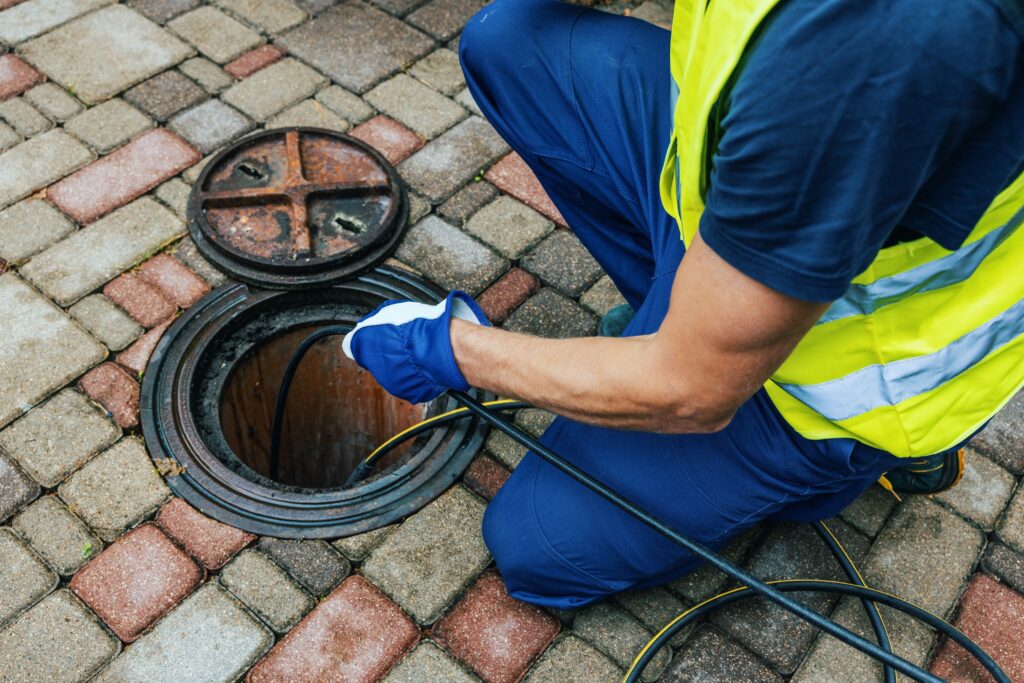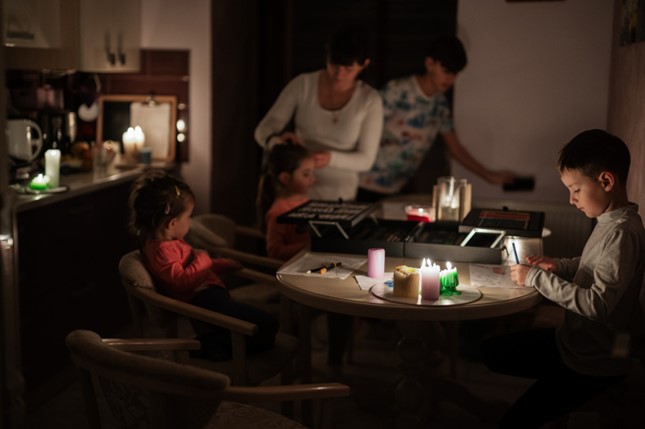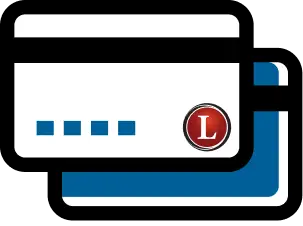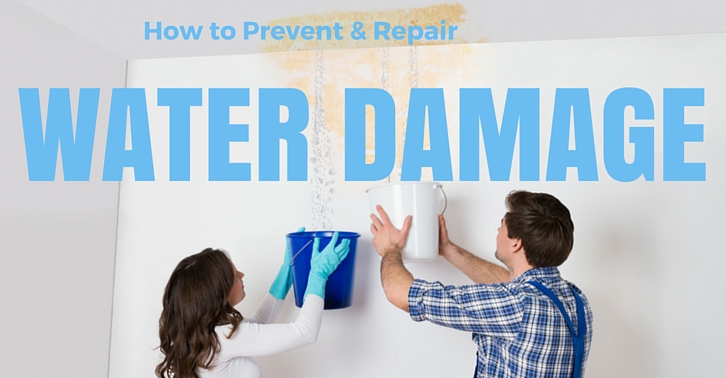
The last thing any homeowner wants to see is a puddle of water anywhere other than inside a sink. Whether it’s the house itself, or the pipes running through it, water sources are everywhere and the damage from slow leaks or major breaks can be severe. It’s always a good idea to regularly inspect your home and respond immediately to any possible water hazards.
Dangers
Water gets everywhere and will eventually manage to erode its way through almost anything. A leak or a drip will peel paint and damage ceilings and walls. Water that’s left standing will warp wood and tile floors or stain and damage carpets. Any surfaces (especially those in dark corners) that retain moisture will eventually develop mold and mildew. Mold will give a musty-wet smell to a room while remaining an eye-sore and lowering the value of your home, eventually leading to permanent damage if not dealt with. Some molds, such as black mold, are hazardous as well. Porous surfaces such as sheetrock walls are especially vulnerable.
Obviously water damage will hit your bank account as hard as it hits your home, but sometimes you’ll find that it’s even more expensive than the repairs and replacements of lost belongings. Leaking pipes and appliances can lead to excess water usage, which adds up over time to a pretty hefty bill every month. Not to mention the environmental cost of wasted water.
Water has to come from somewhere, but since it flows along pipes, walls, and surfaces, it can be extremely difficult to find the source of the water that’s causing the damage. While a standing pool under your sink may be obvious, the source of water peeling wallpaper in an upper corner can be much harder to track down.
Plumbing and Appliances
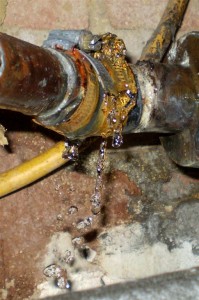
Corrosion and dripping are
clear signs of future
disaster. Image courtesy
of Les Chatfield.
You should be conducting regular inspections of the plumbing in your house. It’s better to catch a leak before it happens than to deal with damage, but sometimes a leak can form very quickly. Inspections should be at least once or twice a year, preferably conducted by a professional, with a regular visual inspection for corrosion, cracks, loose connections, or dripping from the pipes in your home. It’s a good idea to inspect your pipes if the temperature drops below 30°F. Frozen pipes do not immediately lead to water damage, but as they warm back up water pressure can widen the cracks and lead to flooding.
PRO TIP: If your pipes freeze over, turn off the water main and open the nearest faucet. Use a hair dryer to warm up the pipes slowly to allow the water to drain out the open faucet. This allows the ice to clear without back-pressure building up.
Any fixtures (sinks, toilets, baths, etc) should be examined for leaks or uncaulked seams. If you find any leaks, it’s best to shut off water to that fixture until it can be repaired. This is true for any pipeline or fixture. For serious plumbing issues, always call a professional to repair it.
Even when your pipes and fixtures are in good working order, you may find leaks coming from your appliances. Water heaters, dishwashers, and washing machines should all be serviced regularly for performance. Replacing old hoses and tubes before they wear out will prevent costly water cleanup. Ensuring that any basement water pumps are working properly before the stormy season starts is highly advisable. Otherwise, it’s better to not run appliances with heavy water loads while you’re not present. You can even save money on electricity by shutting off your water heater when you’ll be gone for an extended period.
Weather Proofing
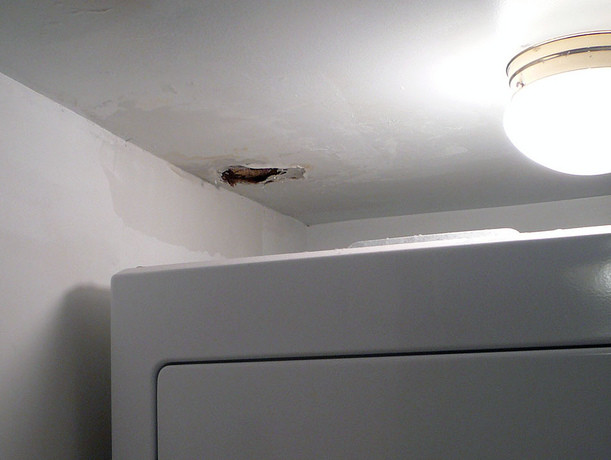
Any water that leaks in will damage
your ceiling and walls. Image courtesy
of Michael Mandiberg.
You’ve inspected and proofed all the equipment in your home, but those aren’t the only sources for water damage. Proper runoff control from your roof (clear gutters, drain pipes, and downspouts) prevents water from pooling and eventually leaking into the attic of your home. Damaged shingles or flashing from an improperly maintained roof, or even one damaged by storms, can lead to leaks that ruin insulation, ceilings, or walls. From drip edge to downspout, all of the water from your roof should flow away from your house and its foundation. Making sure that excess rainwater doesn’t pool around the foundation will help prevent foundation damage due to water erosion beneath the house.
Roof connections, window seams, and door jambs should all be weatherproofed and sealed against the elements. Properly sealed homes won’t just prevent water damage due to seepage, but they remain insulated, making it cheaper to regulate indoor temperature.
As an added note, you should check annually (in advance of the winter season) to make sure that your attic is sealed against your HVAC system. If your central heating is leaking into the attic it will become too warm, melting snow and ice from the roof. This freshly heated water fills your gutters and begins to form ice dams at the edge of your roof. Ice dams can cause severe damage to your roof and gutters when the weight becomes too much. The liquid water, heated by the inside temperature of your attic, can also begin to seep inside, causing permanent damage to your home. An annual inspection for ventilation leaks by an HVAC technician will easily prevent this from being a problem.
Thankfully, the people of Water Damage Defense have provided everyone with a quick guide to water damage and how to prevent it:
Courtesy of: Water Damage Defense
Water damage is a serious issue. From mold to damaged family documents, a leaky pipe or appliance can spell a costly disaster if not remedied quickly. Fortunately, most of the danger can be stopped before it starts with regular inspections of your home and rapid response to needed repairs. If you see a leak or suspect water damage, especially from your indoor plumbing, don’t hesitate before getting it repaired!
Call at (301) 733-5428 for choosing, installing, repairing, and maintaining your sump pump. For over 65 years, we have been providing Hagerstown and the surrounding areas with quality plumbing services. Make us your first call!
Check out our maintenance plan; we provide fall and spring HVAC tune-ups, 15 % off all repairs, and much more!
Follow us on Facebook, Twitter, and Google+ for more useful information and how-to’s.




